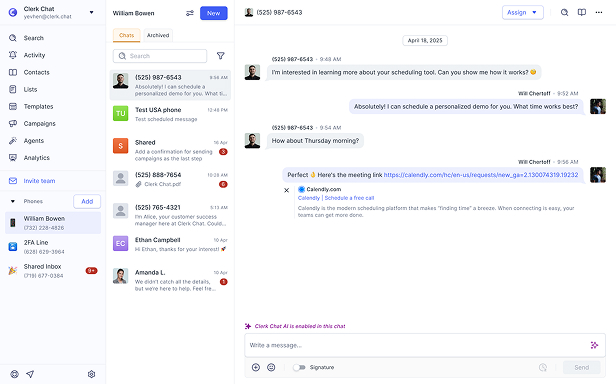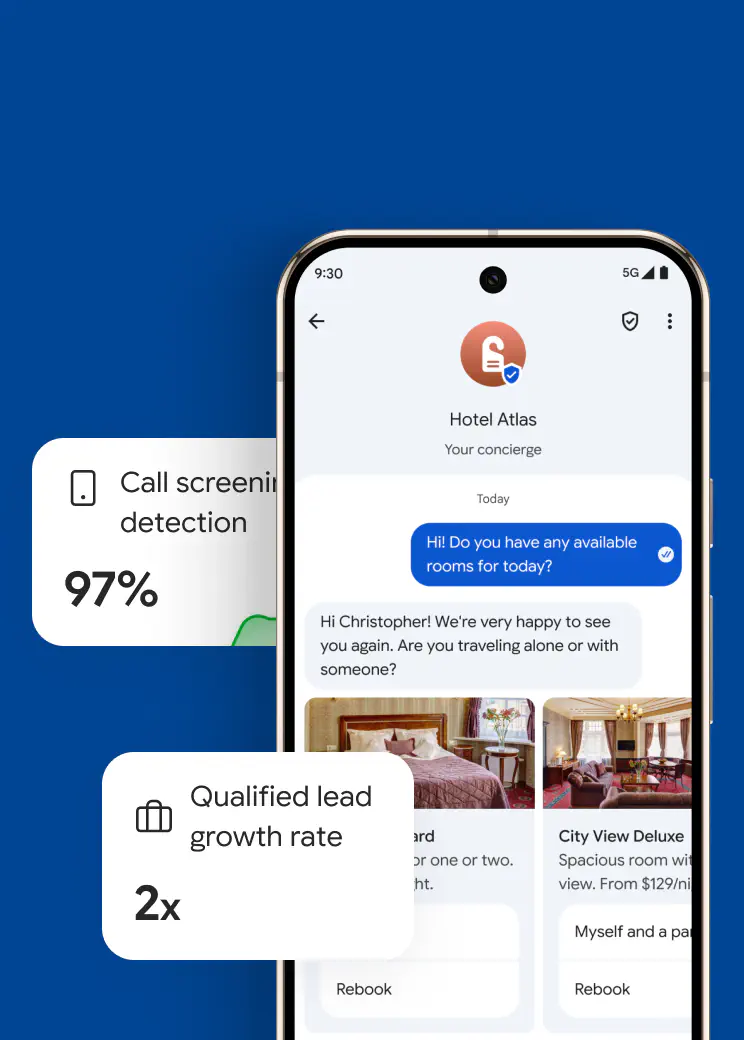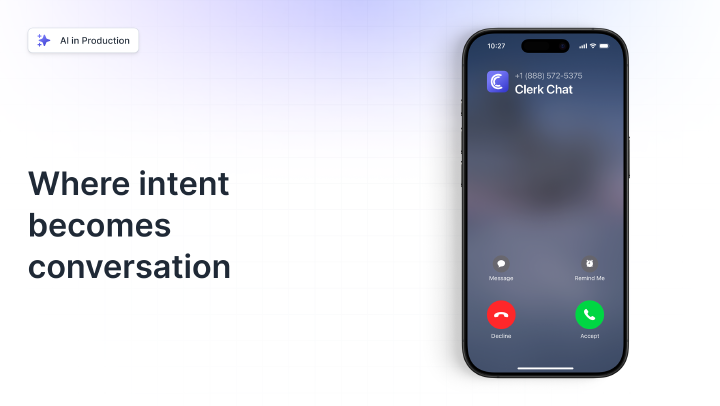The Pros and Cons of Using Personal Phones for Business Communication
By Team Clerk Chat
- Published: November 13, 2024
a personal phone for business communication isn’t exactly a new concept these days. The “Bring your Own Device” (BYOD) trend has grown significantly as companies look for ways to support hybrid and remote work, reduce costs, and boost employee engagement.
In fact, around 75% of American workers use their cell phones for work purposes. Empowering companies to use personal devices has a lot of benefits. It ensures staff members can enjoy a straightforward, familiar experience when they’re texting or calling customers and colleagues.
Plus, it reduces the amount companies need to spend on new devices for staff. Unfortunately, there are downsides to consider, too. Using a personal phone for work exposes employees to a host of issues with SMS protection, compliance, and security.
Here’s everything you need to know about the pros and cons of using personal communication devices in the workplace.
Not sure whether to allow personal phones for business communication? Our experts can help.
Protect sensitive data
Comply with industry regulations
Separate business and personal numbers
Collaborate with team messaging
Business Phone Policies: The Common Options
Phones are a necessary resource in the modern workplace. Virtually every type of team member, from sales and marketing staff to executives rely on cell phones for a range of tasks. They use them for 2-way SMS conversations with customers, internal collaboration, and web-based research.
How companies enable access to smartphones, however, often varies. The most common business cell phone policies include:
- Company-owned, business-only (COBO): This is when a company provides a cell phone to an employee that they exclusively use for work-related purposes.
- Company-owned, personally-enabled (COPE): With this policy, the firm purchases a cell phone for the employee, but allows them to use it for non-work tasks.
- Choose your own device (CYOD): Here, employees pick a phone from a company-approved list, and it’s loaded with specific software.
- Bring your own device (BYOD): With BYOD, an employee starts using a personal phone for business purposes. They’re responsible for securing and maintaining the device.
The Benefits of Using a Personal Phone for Work
There are plenty of reasons why using a personal cell phone for work makes sense for employees, and business leaders. We all have our own preferences when it comes to the devices we prefer to use, and using a personal device gives us the freedom to choose the phone that suits us best.
When employees use their own devices for work, they, and their companies benefit from:
- Control: You get to choose from a range of smartphone models and leading carriers for your personal phone. You can customize your phone however you want, add your own apps, and you don’t have to worry about getting into trouble if you damage the device in some way.
- Simplicity: You already know how your phone works, how to make the most of the apps on it, when to charge it, and so on. This makes using your personal device at work easier. You don’t have to worry about jumping between a business phone and personal phone every day.
- Availability: 61% of companies expect their employees to be constantly available, even without a company-issued phone. However, some business phones need to stay in the office at all times, making availability an issue. Your personal phone is there whenever you need it.
- Cost savings: Not only do employers save money because they don’t have to issue new phones to employees, but staff can save cash too. Some companies place employees on specific contracts, saving them money on phone bills.
- Freedom: Over time, you can easily upgrade your phone, without having to wait for approval from your manager or CEO. Plus, you’re free to use your phone however you like, whether you’re playing on apps or collaborating with colleagues.
The Problems with Using a Personal Phone for Business
Using a personal phone for business purposes can be great, but there are a lot of potential downsides too. Personal phones might not have all of the advanced features you need to excel in your role, particularly if you need to purchase the device yourself on a budget.
Plus, it’s much harder to adhere to compliance and security guidelines with a personal device. Even if you use things like MFA (Multi-factor authentication) and strong passwords, there are a lot of risks to overcome surrounding security.
The biggest downsides of using a personal phone for work include:
Poor Work-Life Balance
Just because many business leaders want their employees to be available 24/7, doesn’t mean they should be. Employees need time to switch off and disconnect from internal SMS messages, email notifications, or calls. It’s harder to achieve work-life balance when your work phone is also the device you use every day for personal tasks.
You might find yourself constantly struggling to keep on top of notifications of all hours of the day and night, increasing your stress levels.
Privacy Issues
Using a personal cell phone for work brings privacy issues. First, if you’re using certain apps on your phone for personal reasons and business communications, it’s easy to get confused. You might attempt to respond to a customer through a MS Teams SMS integration and end up sending sensitive data to a friend or family member instead.
This could mean you end up accidentally going against compliance mandates, such as HIPPA texting regulations. Secondly, if your company requires you to install security and endpoint management apps on your phone, they might gain access to personal information about you. You may even be asked to wipe your phone when you leave a company, which means you lose data like phone numbers and photos.
Security and Liability
Security and compliance issues are often the biggest barrier to using personal phones for business purposes. Aside from the various SMS compliance issues you’ll need to consider that dictate how you store and manage data on your phone, there are other risks too.
If your phone is lost or stolen, criminals could gain access to sensitive business data, putting both you and your company in a dangerous position. This is even more problematic for employees who use shared accounts with other team members who might share additional data. If you download unsecure apps, you could end up with malware or viruses on your phone, which lead to data breaches.
Rigidity
Depending on a company’s BYOD policy, there may be various restrictions in place about how employees can use their device. Businesses might restrict employees from using certain applications and integrations on their phones, or require them to ask permission to download apps.
Additionally, you may be bound to the phone and number you’re given by your business. You won’t always be able to use a different number for your clients, colleagues, and personal contacts. This makes it harder to present a professional appearance, and protect your privacy.
Can I Use My Personal Phone for Business Purposes?
Ultimately, whether you’re permitted to use a personal phone for business communications, it all depends on the company you work with. Some organizations do support BYOD policies and allow users to work on any device they like.
However, the downsides to using a personal phone for business often outweigh the benefits. If you’re anxious about the privacy, security, and rigidity issues associated with personal device usage, there are a few other options. You could consider using a dual SIM phone, which allows you to use two numbers on the same device.
This is a great option for adhering to TCPA texting compliance standards, but dual SIM phones aren’t always easy to access. Another option is to use a business phone and a personal phone separately. Again, this addresses a few security and privacy issues, but it’s far from the most convenient option.
The best strategy is to use a software solution that allows you to add business messaging and calling functionality to your phone, while adhering to strict security standards with VoIP.
Not sure whether to allow personal phones for business communication? Our experts can help.
Protect sensitive data
Comply with industry regulations
Separate business and personal numbers
Collaborate with team messaging
Why Business VoIP Apps Make Sense
Ultimately, getting a Voice over Internet Protocol (VoIP) number that enables access to business messaging and calling makes the most sense.
Instead of getting a new device or SIM card, you can subscribe to a service from a company like Clerk Chat, and instantly access the functionality you need – on any device. Once you download the app on your device, you can make and answer calls, and send or receive text messages with ease.
Plus, companies like Clerk Chat will show you how to port a phone number into your app, so you can use the same business number for all interactions.
The Benefits of Clerk Chat for Business Communications
With Clerk Chat, employees and companies benefit from:
- Flexibility: You can download your communication app onto any device, and choose any number you want to use for work. Plus, all you need is a reliable internet connection to make calls and send texts, so working remotely is no problem.
- Reduced costs: Since you don’t need extra devices or infrastructure, the costs of using a VoIP texting and calling solution are often much lower. Plus, the call charges can be lower for long-distance calls, too.
- Work-life balance: With a dedicated business phone number, you can maintain control over your work-life balance. You can decide when you receive calls and texts from team members, reducing the risk of burnout and stress.
- Security: Using a VoIP solution keeps your work and personal conversations separated. This means there’s less likelihood you’ll stumble into privacy and compliance issues. Tools like Clerk Chat even come with advanced access controls and encryption options.
- Freedom: With Clerk Chat, you can bring your own carrier to any application you’re using for communications and use any existing tools you like. You can even add SMS and calling functionality to solutions like Microsoft Teams.
- Advanced features: VoIP applications come with business-focused features, like mass messaging solutions, templates, SMS AI assistant tools, automation capabilities, and even reporting and analytical tools for business leaders.
- Simplicity: With a solution like Clerk Chat, you get to enjoy the same consistent and familiar experience you love on your preferred device.
Using a Personal Phone for Business: The Best Strategy
Ultimately, using a personal phone for business communication has its benefits. However, it’s important to ensure you’re taking the right precautions.
Using a solution like Clerk Chat to embed business messaging and calling features into a personal device ensures team members can use the phones they prefer, without compromising privacy and security. Our intuitive and flexible platform eliminates the common concerns associated with BYOD policies, gives companies and staff more freedom, and makes it easy to access advanced features.
Discover how a VoIP solution can transform any device into a powerful tool for internal and external communications with a free Clerk Chat demo today.
In this article:
Ready to use your business number for text messaging?
Thousands of businesses are already experiencing the power of conversational messaging through SMS. Join us. Free trial and paid tiers available.
Get Started#Subscribe
Get product updates in your inbox
Tutorials, features, and Clerk Chat news delivered straight to you.



